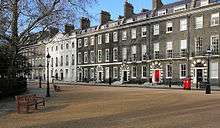St George the Martyr, Holborn
| St George the Martyr Holborn | |
|---|---|
|
| |
| Country | United Kingdom |
| Denomination | Anglican |
| Website |
www |
| Architecture | |
| Heritage designation | Grade II* |
| Designated | 24 October 1951 |
| Architect(s) | Arthur Tooley, Samuel Sanders Teulon |
| Administration | |
| Diocese | London |
St George the Martyr Holborn is an Anglican church located at the south end of Queen Square, Holborn, in the London Borough of Camden. It is dedicated to Saint George, and was originally so-called to distinguish it from the later nearby church of St. George's Bloomsbury, with which it shared a burial ground (now St George's Gardens).[1] While the historical name remains its formal designation, it is today known simply as St George's Holborn.[2]
History
The church was built in 1703–06 by Arthur Tooley, as a chapel of ease to St Andrew, Holborn.[3] Tooley was paid £3,500 to build the chapel and two houses by a group of fifteen trustees including Sir Streynsham Master.[4] It was later bought by the Commission for Building Fifty New Churches and became a parish church in 1723, receiving the dedication to St George, in honour of Streynsham Master's governorship of Fort St George in India.[5]
The antiquary William Stukeley was the rector from 1747 to his death there in 1765.[6]
The church was remodelled in the early nineteenth century by J.B. Papworth, who added a bell-tower and two frontages to what had previously been a plain brick building,[5] and once again in 1867–69 by S. S.Teulon, who almost entirely changed the exterior, removed the galleries and added the present columns and roof.[3]
It was at this church that Ted Hughes and Sylvia Plath married on Bloomsday in 1956.[7] The church was designated a Grade II* listed building on 24 October 1951.[3]
Notes
- ↑ "History". Friends of St George's Gardens. Retrieved 1 May 2012.
- ↑ "St George's Holborn". Retrieved 1 Jan 2014.
- 1 2 3 Historic England. "Details from image database (477826)". Images of England. Retrieved 23 January 2009.
- ↑ Hughson, David (1807). London:Being an Accurate History and Description of the British Metropolis and its Neighbourhood. 4. London. p. 396.
- 1 2 Elmes, James (1831). A Topographical Dictionary of London and its Environs. London: Whittaker, Treacher and Arnot. p. 205.
- ↑ Timbs, John (1867) [First edition published 1855]. Curiosities of London (New ed.). London: J.S. Virtue. p. 163.
- ↑ Walking Literary London, Roger Tagholm, New Holland Publishers, 2001.
External links
Coordinates: 51°31′16″N 0°07′21″W / 51.5210°N 0.1224°W
